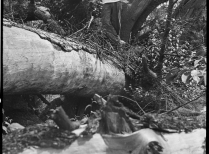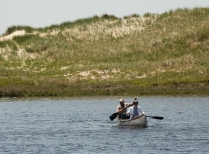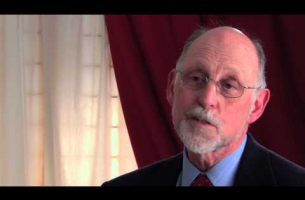You are here
Historical and Retrospective Studies
Global environmental change is altering ecosystems worldwide by changing disturbance patterns, plant growth, and ecosystem structure and composition. Determining whether these changes fall within natural ecosystems dynamics or represent something new is key to management and conservation. Historical and retrospective studies reconstruct ecosystem dynamics and climatic change over centuries (via historical documents, tree-ring analysis) and millennia (via sediment cores from wetlands and lakes, archeological research) are an excellent way to provide the long-term context for current day disturbances and ecosystem conditions.
The emphasis on the past continues today, as nearly every field study conducted by researchers at the Forest incorporates a historical component to evaluate current conditions and identify the magnitude and direction of changes that have occurred over time. Through these historical studies we are able to extend the timeframe of our research and use the collective historical and ecological insights to provide guidelines and a framework on which to base successful conservation, management, and policy initiatives, especially in the context of ongoing global environmental change.
The Harvard Forest has a rich history of retrospective studies, including studies that have led to the development of new approaches to historical ecology. Among the many discoveries made through Harvard Forest research, scientists have:
- quantified the long-term impact of the 1938 hurricane on the structure and composition of an old-growth forest and the New England landscape,
- found that 300 years of human land-use has changed the composition of New England forests, but not the spatial distribution of tree species in the region,
- summers in the Northeastern U.S. have gotten substantially wetter and rainier in recent decades
- old-growth forest and old trees are still being found in the region, often in steep, inaccessible terrain, but sometimes in areas with high visitation,
- old-growth forests differ in structure, composition, and appearance from 2nd growth forests that dominate the landscape
- the legacy of past disturbances, whether they be windstorms, fire, extreme climatic events, species loss, or human land-use, echo for centuries in the ecology of today’s forests.
In addition to the researchers below, numerous Schoolyard Ecology LTER students and teachers collect and contribute data through the Our Changing Forests project.
Associated Researchers
Elizabeth Chilton (UMass Amherst)
Brian Donahue (Brandeis University)
David Foster
David Orwig
Wyatt Oswald (Emerson College)
Neil Pederson
Jonathan Thompson
Related Data & Publications
Publications - Published papers from Harvard Forest related to historical and retrospective studies.
Datasets - Data and metadata for historical and retrospective studies at the Forest.
Abstracts for Current Research - Summaries of ongoing historical and retrospective studies at the Forest.




